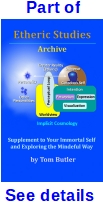Introduction
 Perhaps more than most, people who study the nature of mind as it relates to the psi field and survival, understand the need for a second opinion from others. As a cosmological model, virtually all paranormal phenomena are trans-etheric influences. The etheric aspect of what we experience is conceptual. That means it is experienced based on our worldview. It is only after our minds have filtered this conceptual experience in our unconscious mind do we become aware of the experience, and then only as a representation based on what we think of it … in our unconscious mind. see: Perception
Perhaps more than most, people who study the nature of mind as it relates to the psi field and survival, understand the need for a second opinion from others. As a cosmological model, virtually all paranormal phenomena are trans-etheric influences. The etheric aspect of what we experience is conceptual. That means it is experienced based on our worldview. It is only after our minds have filtered this conceptual experience in our unconscious mind do we become aware of the experience, and then only as a representation based on what we think of it … in our unconscious mind. see: Perception
The objective of peer review is to provide what amounts to a rationality check to make sure reports make sense to people who are not as familiar with the subject as the author. Such reviews are also important if the peer reviewers are knowledgeable about the subject and are able to offer technical criticism intended to improve the report.
Peer review is available amongst people trained in the academic way, but very uncommon for the rest of the paranormalist community. However, the paranormalist community is maturing and input from others is becoming more available. This evolution brings with it the need for more mindfulness in how criticism is delivered.
Unthinking and/or Unfounded Criticism
Amongst academics and lay people alike, there are the occasional bad players who, rather than offering helpful comments, choose to turn criticism into a personal attack, rather than constructive comment. While mainstream skeptics are expected to be as mean-spirited as they can be, such negative criticism is not expected from fellow paranormalists.
Negative criticism from within the paranormal community is especially damaging because, if the criticism is found on a paranormalist website or in a paranormalist journal or book, the public tends to assume what they are reading is written by someone who is something of an authority. In effect, the author of the criticism is speaking under a cloak of authority and what is said has the potential of considerable unexpected consequences.
Reading such “internal” attacks also leaves the public with the sense that our community is in disarray. Even more damaging is the unavoidable conclusion that what is being talked about … the paranormal … is not real at all. Clearly, it is our community’s inability to speak with one voice in terms that demonstrate a rational understanding of our subject.
Of course, mainstream skeptics such as James Randi followers are delighted when one of our own attacks another paranormalist. Links to the negative criticism quickly appear in skeptic talk forums and sometimes show up as references in Wikipedia articles which are used to attack things paranormal.
Academic Criticism
The assumption of authority is especially evident when a doctorate in any field talks about things paranormal. Examples of how doctorates have taken the low road of negative criticism under the cloak of authority are the so-called research reports authored by Stephen Braude (doctorate in philosophy) and Michael Nahm (doctorate in biology). See: Debunking Survival Under Cover of False Academic Authority
A second example of a person working outside of his training and pronouncing on that subject under the cloak of authority is Imants Barušs (a psychologist). The “Failure to Replicate EVP” so-called research report he authored has been used as a negative reference seven times in Wikipedia’s Electronic Voice Phenomena article. See: Critiquing ITC Articles written by Imants Barušs
Associations as Bad Citizens
Perhaps the most important organizing influence for the paranormal community is the association publishing peer-reviewed and less formal journals, newsletters and magazines. Professional organizations such as the Society for Psychical Research and Parapsychological Association are primarily focused on the work of parapsychologists who hold a doctorate. And as such, most paranormalist look to them as authoritative organizations.
The Society for Scientific Exploration (SSE) is mostly supportive of the paranormal community; however, it has proven to be selective in that support. The journal, for which Stephen Braude is the editor (see Academic Criticism, above), has publish articles in its “peer-reviewed” journal that have been mostly negative about the idea of survival of personality after bodily death. Of course, the three negative articles mentioned above were published by the SSE.
Peer Review: It is worth noting that even the mainstream practice of peer review for articles before publication has been corrupted by some of the publishers. In fact, no way is offered for the public to know if and how articles have been, in fact, peer-reviewed. While claiming peer-review serves to exaggerate the apparent authority of articles, using anonymous reviewers leaves too much room for criticism and doubt.
Ghost Hunters and Citizen Scientists as bad Citizens
There are numerous hauntings investigation organizations who work to be citizen scientists, and ghost hunting clubs just having fun. Most have an Internet website to show their work, including investigation accounts and examples gathered in the field. While it is natural for these organizations to be competitive, sometimes, this competitive spirit evolves into a “right versus wrong” attitude toward others.
An example of this negative criticism began as an attitude promoted by a ghost hunting club which appears to be defunct, or at least no longer promoting negative criticism. However, an off-shoot of that organization has maintained a list of people and organizations in the paranormal community they think are misbehaving. It also appears to be defunct.
Community Response
While we all need to work together to bring things paranormal into the mainstream, it is most disheartening to see members of our own community attack other citizens. The public only sees the loudest voice, and is most inclined to accept the word of a doctorate over a lay person, no matter what the subject might be.
It is important that everyone in this community, especially the associations leaders, website owners and/or group leaders, know how to speak in clearly state terms. Being an activist and speaking is essential, but all of us need to ask ourselves:
-
How will my words affect the community?
-
Do my words further understanding?
-
Do my words provide positive feedback?
-
If negative, are my words defensibly with solid research and will they help the person improve or the community in general?
If the answer is no to any of these, then we must remain silent! It is important to speak out against the skeptical commentary with an even mind and mild manner no matter from where the skepticism originates.

![]()

